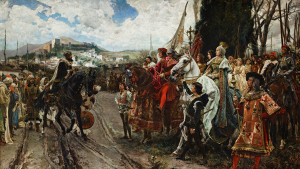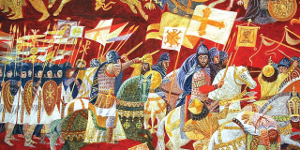The Crusades
|

|
|
Share This Page
|
|
|
|
|
|
|
Follow This Site

|
 |
|
|
|
|

|
Part 4: Other Crusades
Also of significance were these struggles:

- The People's Crusade, in 1096: in which thousands of Jews were murdered by Christians.
- The Reconquista, from 718 to 1492, an ongoing struggle by Christian forces in what is now Spain to retake lands held by Moors.
- The German Crusade, in 1197–1198, in which German armies captured the cities of Beirut and Sidon.
- In 1212, thousands of young people gathered to march to Jerusalem, to try to succeed where their elders had failed. They didn't make it. This is often referred to as the Children's Crusade. Some accounts of this set of events include details of the children's being marched to Italy and then sold into slavery.
- Another movement involving youths, the Shepherds' Crusade, took place in 1251. This was an effort to rescue King Louis IX of France, who had been captured in Egypt during the Seventh Crusade.
- The Albigensian Crusade, in 1209–1229, was an attempt by one Christian force to eliminate another. The target of the attacks were members of the Cathar faith, who were at odds with most of the rest of Christian Western Europe.
The common perception of the Crusades is that they were a religious enterprise, of Christian warriors out to reclaim some of their religion's most sacred places from occupying armies and people who practiced another religion. That was certainly a motivator for many a Crusader, who was only too happy to share his status by wearing proudly the Christian cross on clothing, shield, and other elements of his outfit.
The powers of Western Europe also had other drivers in pursuing the Crusades:

- New lands: Nobles saw in the Holy Land opportunities for obtaining new lands. The same was true of monarchs, who dreamed of extending their domains with new territories.
- Economics: Muslim takeover of the Holy Land and other parts of what had been the Byzantine Empire put into doubt the safety and efficacy of the Silk Road and other trade routes. At the same time and in a different way, some Western monarchs wanted to bypass the Byzantine middlemen and deal directly with traders from the East and Middle East.
- Lack of discipline: The tradition of knighthood was a powerful one at this stage in Europe's development; it was also a time before the ideals of chivalry took hold. Many a knight was known more for his bad behavior than his good manners. Some leaders who had depended on knights to help protect their lands and realms found in the Crusades a good excuse to send these sometimes troublesome men-at-arms off an overseas adventure. Many, tired and bored at home, were only too willing to go.






